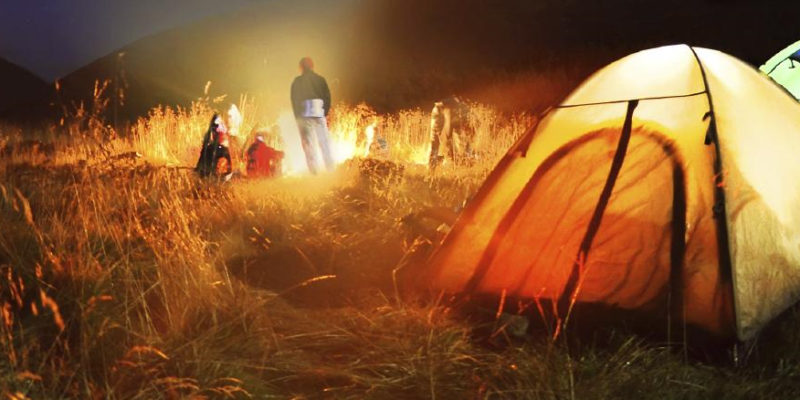Camping Generators – Important Features
The most important features of a camping generator include size, power source, hookups, noise level, and a few other things you must consider when shopping for this item. As there are a great many quiet camping generators available on the market today, you’ll have plenty of options to choose from.
You should always start with deciding which features are most important for you. With this kind of ‘profile’ in mind, you’ll be able to compare various models and pick the best portable generator that meets your specific needs. Take a look at our recommended portable generators for camping below:
| MODEL | POWER | SIZE | FUEL | RUN-TIME | LOUDNESS | PRICE | |
|---|---|---|---|---|---|---|---|
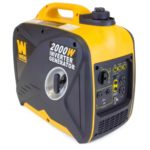 | WEN 56200i | Medium 2000/1600 watts | Small (18x11x18in) | Gas | Medium (6hrs) | Very Low (51 dBA) | Medium |
 | Westinghouse WH2400i | Medium 2400/2100 watts | Small (16.5x10.7x19in) | Gas | High (11hrs) | Medium (59 dBA) | Medium |
 | Goal Zero Yeti 150 | Low 80 watts | Very Small (7.6x6.8x5.8in) | Solar / Power Bank | Low (150Wh, 14000 mAh) | Noiseless | Low |
| Honda EU1000i | Low 1000/900 watts | Small (19x15.9x11in) | Gas | Medium (8.3hrs) | Low (53 dBA) | High | |
 | Yamaha EF2000iSv2 | Medium 2000/1600 watts | Small (17.9x11x19.3in) | Gas | High (10.5hrs) | Low (51.5 dBA) | High |
7 Most Important Features of the Best Camping Generator
Note that all these features are equally important so it’s only your personal preferences that determine which is most important for you. The best generator for camping must be reasonably small, fuel-efficient, and equipped with every safety feature possible.
Some of the models available today are equipped with various extra features to make them more attractive. For example, they might have a fuel indicator, stylish design, mounting fixtures, etc. These are all secondary factors that you should consider only after you analyze the following main features and need to pick the best portable generator from your shortlist.
1. Noise Level
 The most important feature of a camping generator is noise level because the device will be located not far from you. This means that it can keep you up through the night if you let it run. Even if you aren’t a light sleeper and can ignore the rumbling of the engine, having a source of loud noise in the wild is extremely dangerous.
The most important feature of a camping generator is noise level because the device will be located not far from you. This means that it can keep you up through the night if you let it run. Even if you aren’t a light sleeper and can ignore the rumbling of the engine, having a source of loud noise in the wild is extremely dangerous.
If you are camping out in a forest, the sounds emitted by your camping generator might attract predators. When staying at a specialized and protected campsite, the noise might anger your neighbors. You also must bear in mind that any disturbance will aggravate the wildlife in the area. Thus, your mini generator can become a source of stress and danger for some small animals.
Considering all this, it becomes obvious that buying a quiet run generator is always best. There is no such thing as a completely silent generator as these devices use engines. However, manufacturers use a variety of tricks to reduce the noise to manageable levels.
Quiet camping generators have the decibel (dB) rating between 50 and 60. This is approximately the level of a regular conversation. The camping generator’s label must provide this information.
Bear in mind that the noise level is directly connected to the power of the engine. The more powerful your portable generator, the louder it is. However, some manufacturers use special tricks to reduce the noise. For example, many Westinghouse models feature double-sealing that acts as a sound buffer. Some other companies also install various mufflers.
2. Size & Weight
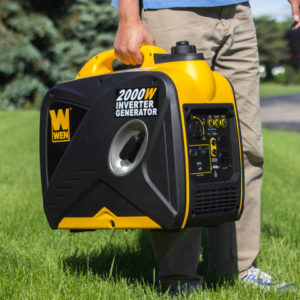 The size and weight of a camping generator influence its portability, efficiency, and power output. This type of power tools must be small so that you can actually take it on a camping trip. However, the size of the fuel tank and engine determine how long the device can run and how powerful it is.
The size and weight of a camping generator influence its portability, efficiency, and power output. This type of power tools must be small so that you can actually take it on a camping trip. However, the size of the fuel tank and engine determine how long the device can run and how powerful it is.
The vast majority of quiet camping generators produce 900-2,000 Watts of power and weight 50-90 lbs. There are some smaller models that anyone can carry in a backpack if the need arises. However, you can also find larger devices that weight about 100 pounds and have 3+ liters fuel tank capacity. These can run for about 12 hours on a single tank.
Consider how you are going to transport it and how much power you need when choosing the best camping generators. Check the power requirements on the appliances you want to support with the camping generator and calculate the necessary generator power output. Then, find a model that can give you this and pick the most convenient size.
Remember to consider the tank capacity and take into account how much fuel you can take with you on a camping trip.
When assessing the weight of the device, plan for every situation. For example, on a camping trip you might need to carry the piece from the vehicle by hand, so an extra-heavy model is a definite no.
3. Hookups
 Camping generator hookups determine how convenient using the device will be. In most cases, portable power tools are very limited in terms of outlets and receptacles, so this feature shouldn’t be your most important consideration. However, you must be sure that the device is equipped with the hookups required to meet your specific needs.
Camping generator hookups determine how convenient using the device will be. In most cases, portable power tools are very limited in terms of outlets and receptacles, so this feature shouldn’t be your most important consideration. However, you must be sure that the device is equipped with the hookups required to meet your specific needs.
Usually, quiet camping generators feature:
- 12V 8A DC output
- 1-2 120V AC outlets (3-pronged)
Some models even have USB ports, which make charging smartphones and tablets easy.
You can always purchase other receptacles and connect them to the generator in order to increase the number and variety of outlets. However, the best camping generator must be able to run all your most important devices without these ‘aids’. An extension power cord might be lost or damaged during the trip, so you have to be confident that this won’t rob you off the ability to use the power.
4. Power Source
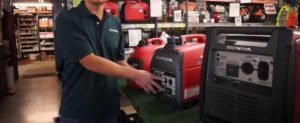 The vast majority of quiet camping generators are powered by engines that run on gas or diesel. You can also find models that run on:
The vast majority of quiet camping generators are powered by engines that run on gas or diesel. You can also find models that run on:
- Biodiesel
- Sewage gas
- Natural gas
- Propane
- Batteries
Each option has its pros and cons that mostly pertain to the impact of the device on the environment as well as cost and ease of procuring the fuel.
If convenience is your main consideration when buying a camping generator, you should go for a gas model as it’s the most common and you can refuel almost anywhere. For a professional camper, this option would be best as you can set off on a trip at a moment’s notice and get the essential supplies at the closest gas station.
On the other hand, handling gas or any other type of liquid fuel can be both dangerous and difficult. You’ll need to take a supply of several canisters with you, which means more fire hazards in your vehicle and at the campsite.
The portable camping generator would have the fuel tank capacity of 1-2 liters and a gauge that indicates when the gas is running low. The engines must also be equipped with an auto shutoff feature to ensure the device will turn off when the tank runs dry.
Please remember that a good camp generator must produce only the barest minimum of emissions. It’s extremely important for camping, in particular, because the device will be located near you at all times and exhaust fumes can ruin your experience of the trip.
The cost of the fuel is another important consideration for choosing the power source of your portable generator. The cheapest are the kinds that you can power yourself, for example by using biodiesel. However, these are harder to find and you might not be able to produce the sufficient amount of fuel, especially while on a lengthy trip.
If you are looking for maximum efficiency, choose a portable camping generator that can use several types of fuel. This will allow for maximum flexibility while on a trip with limited resources.
5. Run-Time
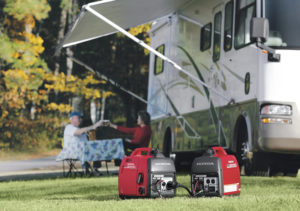 Be aware that the run-time on the label most often pertains to the period the engine can run on a single tank of fuel and ¼ load. This means that power output and tank capacity are the main factors, which influence the run-time of a camping generator.
Be aware that the run-time on the label most often pertains to the period the engine can run on a single tank of fuel and ¼ load. This means that power output and tank capacity are the main factors, which influence the run-time of a camping generator.
The majority of these power tools can work for about 8 hours on ¼ load and up to 3 hours on maximum output. The gas tank for this output must be around 1.5 liters. Keep this information in mind when doing your calculations regarding the amount of power necessary to run your must-have devices.
The run-time is also heavily influenced by the fuel efficiency of the engine. Leading manufacturers of quiet camping generators maximize this particular feature using a variety of tools, for example:
- Installing an electric throttle.
- Creating an economy setting.
It’s always best to choose a camp generator that has several efficiency settings so that you can power it down to save fuel while on a trip. This feature is especially important for people who love to travel far as it can help you maximize the use of gas in an emergency.
Some advanced quiet camping generators of today have an automatic system that adjusts the fuel use based on the current power output level. However, in most cases, you’ll have to do this manually.
6. Inverter
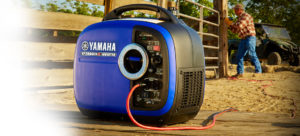 Inverter technology is a must-have for the best camping generator. In simple terms, it’s the feature that allows plugging sensitive electronic devices directly into the generator.
Inverter technology is a must-have for the best camping generator. In simple terms, it’s the feature that allows plugging sensitive electronic devices directly into the generator.
What you need to understand is that these power tools create energy in bursts, unlike the consistent stream of it that runs through your home. These fluctuations are deadly to the microcomputers that run laptops, smartphones, tablets, and other sensitive electronic devices.
An inverter portable generator is a unit that produces a consistent stream of power, which makes it ‘clean’ and safe to use for any tech.
While on a camping trip, portable generators can be a necessity. They allow you to charge a GPS, smartphone, and other essential tools that can be used in an emergency situation. The ability to connect them directly to the generator reduces the risks of losing or damaging a separate inverter device.
Note that an inverter camping generator is also quieter by default.
7. Reliability
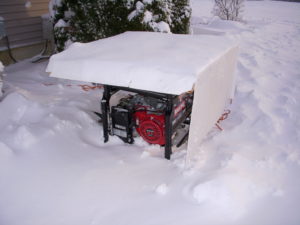 Reliability is definitely one of the most important features of a camp generator and directly connected to both its safety and usefulness. An unreliable power tool is a hazard, especially when it runs on highly flammable fuel. In a camping situation, this can lead to a tragedy, such as a forest fire.
Reliability is definitely one of the most important features of a camp generator and directly connected to both its safety and usefulness. An unreliable power tool is a hazard, especially when it runs on highly flammable fuel. In a camping situation, this can lead to a tragedy, such as a forest fire.
Unlike other features, the reliability of a portable generator can’t be determined from the label alone. Extra safety features, like low-fuel and low-oil shutoff as well as a spark arrestor signify a trusted device. The latter is especially important for a camping generator as tent + spark is a recipe for disaster.
The best way to determine the level of a power tool reliability is to look up its reviews. Buying from renowned brands is also a wise move as these companies are trusted for a reason. You can be confident that they test all their portable quiet camping generators in various scenarios. However, even the best manufacturers might have a bad model, and one can’t afford to take risks with a camp generator.
Independent reviews are created by people who have actually used the device and can share their experience. However, they can be influenced by the writer’s personal bias, so you should always take them with a grain of salt. Focus on technical details and look up safety statistics for both the brand and the model of the mini generator you are interested in.
While on a camping trip and cut off from the civilization, a portable generator becomes an essential survival tool. Thus, its reliability is paramount for your survival. Always take your time to do proper research before buying camping generators as this is an investment in your personal safety.
How to Buy the Best Portable Generator for Camping
To buy the best camping generator you must first decide what matters for you in this device. Do you need more power or longer run-time? How concerned are you with carbon emissions and the environmental impact? What kind of fuel do you have the easiest access to?
Answer all these questions and consider the most important features of a camping generator: noise level, run-time, reliability, power source, inverter, hookups, and size. Find the most suitable model based on every category to create your ultimate shortlist. Then, look into their extra features and cost to pick the best quiet run generator for you personally.
Remember that a mini generator must be safe, efficient, and portable so that you can use it in any situation. The majority of these power tools on the market have similar characteristics. You should choose based on your personal preferences and requirements. You also can get a lot of helpful information about a camping generator by studying its reviews online. If you have time, take a look at our Best RV Generators or Overall Best Portable Generators.
Additional Resources

